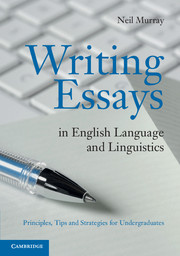 Writing Essays in English Language and Linguistics
Writing Essays in English Language and Linguistics Book contents
- Frontmatter
- Contents
- Acknowledgements
- Introduction
- A guide to the book's icons: what do they mean?
- Part 1 The basics
- Part 2 Getting down to writing
- Chapter 3 Analysing and answering the question
- Chapter 4 The writing process
- Chapter 5 Writing an introduction
- Chapter 6 Writing the body of your essay
- Chapter 7 Writing summaries and conclusions
- Chapter 8 Referencing and quotations
- Chapter 9 Stylistic issues
- Chapter 10 Writing up small-scale research projects or dissertations
- Frequently asked questions
- Linguistics glossary
- Task key
- References
- Index
Chapter 10 - Writing up small-scale research projects or dissertations
from Part 2 - Getting down to writing
Published online by Cambridge University Press: 05 June 2012
- Frontmatter
- Contents
- Acknowledgements
- Introduction
- A guide to the book's icons: what do they mean?
- Part 1 The basics
- Part 2 Getting down to writing
- Chapter 3 Analysing and answering the question
- Chapter 4 The writing process
- Chapter 5 Writing an introduction
- Chapter 6 Writing the body of your essay
- Chapter 7 Writing summaries and conclusions
- Chapter 8 Referencing and quotations
- Chapter 9 Stylistic issues
- Chapter 10 Writing up small-scale research projects or dissertations
- Frequently asked questions
- Linguistics glossary
- Task key
- References
- Index
Summary
‘I've never done a research project before so I just don't know where to start. How big does it need to be? How original? Where do I get a good idea from? I haven't got a clue.’
What's expected of me as an undergraduate student with no previous research experience?
It's quite likely that, as part of your degree programme, you'll be required to successfully conduct and write up a small-scale research project of some kind. Typically, this will be in the form of a dissertation that you work on in your final year of study and which is normally expected to be around 10,000 words in length, although this can vary quite a bit depending on the department and university. The subject of your dissertation is, in most cases, completely open and you're free to decide your own focus according to your particular interests. In some cases, however, the dissertation project may be allied to a particular course you've taken and, as such, will need to have a focus that reflects this. Small-scale research projects tend to be a common feature of degree programmes in English language and/or linguistics and, while these may not necessarily take the form of a fully fledged dissertation, they'll still need to be carefully thought through, conducted (in the case of an empirical study) and written up. This final chapter is designed to help you in this task by providing you with some general principles that will help ensure that your particular project is brought to a successful conclusion and meets with the approval of your tutors and examiners.
The idea of having to conduct research can be quite intimidating, particularly if you have no previous experience. Often feelings of anxiety are the result of uncertainty about what exactly is expected of you and the standards you're required to meet, as well as the sense that you are ‘out on your own’ and having to undertake and keep control of an activity with which you are unfamiliar but which is important to your success as an undergraduate. Such feelings are perfectly natural and as such you can be sure not only that most of your peers are experiencing them to some degree but also that your lecturers are aware of this and have in place mechanisms to help guide you through the process of bringing your project to fruition.
- Type
- Chapter
- Information
- Writing Essays in English Language and LinguisticsPrinciples, Tips and Strategies for Undergraduates, pp. 159 - 197Publisher: Cambridge University PressPrint publication year: 2012


